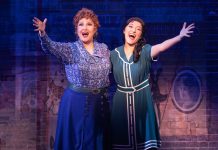With the topic of illegal immigration so prevalent in today’s news, now is the perfect time to take a personal look at the trials and tribulations of those who immigrated here, both legally and illegally, a new play written by The Actors’ Gang ensemble and directed by Actors’ Gang Artistic Director Tim Robbins, features 12 members of the acting company as they tell their ancestors’ stories, reflecting their great diversity, struggles and journeys from oppression to freedom.
The story is a personal testament celebrating the courage and great character of the refugees who came to this country throughout the last 300 years.
My very personal experience of this play began from the moment I entered the theater and was asked to place markers on a posted World map of where my ancestors called home, before immigrating to the United States. I quickly placed two markers on Warsaw, Poland and Kiev, Russia.
You see, all four of my grandparents, as well as my father, escaped oppression in Eastern Europe and the Holocaust by doing whatever they could to get to America for a better life for themselves, their children, and grandchildren. And I thank them every day for the hardship and struggle they endured to make my life one filled with freedom today.
Director Tim Robbins said, “I live in Los Angeles, where one can only be struck by the contributions made to our city by immigrants and people who came here as refugees. The Actors’ Gang felt compelled to respond to the government’s anti-refugee and anti-immigration policies – and to tell a story that draws attention to the true nature of people that live in this country. Save for the Indigenous, all of our families came here as refugees or immigrants.”
Set somewhere between the 19th century and now, “The New Colossus” tells the story of forced migration and the constant struggle for survival and dignity in an uncertain and hostile environment.
The 12 members of the acting company portray characters from different parts of the world, first introducing themselves to the audience by name, age, place of origin, and the date their journey began; then go on to tell their stories, each in a different language, and each in different dress appropriate to their place or origin and the time period during which their journey began.
As different as they each appear, their stories are remarkably similar given the common experience of all refugees fleeing some kind of oppression and moving toward safety and hopefully, freedom.
The play is a movement piece rather than one of the spoken word, since for most of the play we cannot understand the words being said, other than a few times when they are spoken in a second language we can understand, or when broadcast in English via projections designed by Cihan Sahin (which also contain photos of refugees struggling from all over the world). But in those movements we learn their commonality; the need to escape oppressive homelands, packing in a rush while trying to say goodbye to those they love, hanging onto their few possessions in a single piece of luggage with all their worldly possessions. Or seeing them run in circles while fearing discovery, often screaming in fear while attempting to reach a safe place, and most heartbreaking to me, their need to create a fire to stay warm and then allowing other weary and cold travelers to join them.
As Robbins states, “Our hope is that we will be able to illuminate the courage, fortitude and humor of the refugees that have defined this land and, in doing so, discover the similarities that exist between our ancestors and those who are currently struggling for dignity and freedom today.”
I applaud him, the actors (Pierre Adeli, Onur Alpsen, Quonta Beasley, Kayla Blake, Kathryn Cecelia Carner, Jeanette Rothchild Horn, Dora Kiss, Stephanie Lee, Mary Eileen O’Donnell, Zivko Petkovic, Mashka Wolfe, and Paulette Zubata) musicians (David Robbins and Mikala Schmitz) who added in such a meaningful original soundtrack for their travels, for doing so in such an artistic and truly heartfelt way.
General tickets for are available for $34.99. Seniors can purchase $30 tickets, while young adults under 30 and full-time students pay $20. Thursday evenings are “Pay-What-You-Can” for tickets. Call 310-838-4264 or visit www.theactorsgang.com for tickets online. The Actors’ Gang Theatre is at The Ivy Substation, 9070 Venice Blvd, Culver City.














